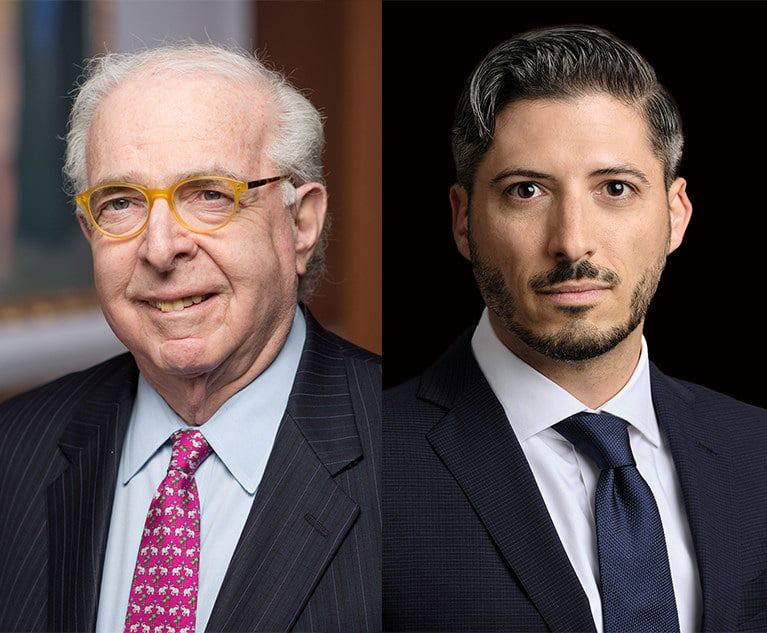Judicial Review of an Arbitrator's Privilege Rulings
Although courts have discretion to adjudicate the merits of privilege objections to an arbitral subpoena, courts may decline to exercise such discretion, as Judge Rakoff did in 'Turner v. CBS Broadcasting'.
June 22, 2022 at 10:00 AM
9 minute read
 When parties agree to arbitrate their disputes, they consent to have an arbitrator, rather than a court, resolve disputes about whether particular documents are discoverable, including whether the documents are privileged. A novel legal issue exists, however, with respect to whether, in connection with a petition to enforce an arbitral subpoena under the Federal Arbitration Act (the FAA), a district court is authorized to consider de novo privilege objections to the production of the requested documents.
When parties agree to arbitrate their disputes, they consent to have an arbitrator, rather than a court, resolve disputes about whether particular documents are discoverable, including whether the documents are privileged. A novel legal issue exists, however, with respect to whether, in connection with a petition to enforce an arbitral subpoena under the Federal Arbitration Act (the FAA), a district court is authorized to consider de novo privilege objections to the production of the requested documents.
In Turner v. CBS Broadcasting, 2022 WL 1209680 (S.D.N.Y. April 25, 2022), U.S. District Court Judge Jed S. Rakoff for the Southern District of New York recently addressed this issue of first impression, concluding that a court is authorized, but not required, to consider de novo privilege objections to an arbitral subpoena. In Turner, Judge Rakoff declined to exercise that authority because, among other things, he concluded that "even a cursory review reveals that the arbitrator's … decision to overrule CBS's assertion of privilege over the … documents [at issue] was anything but arbitrary."
'Turner'
In Turner, the petitioner, the International Brotherhood of Electrical Workers Local 1200, AFL-CIO (IBEW or Union), sought to enforce an arbitral subpoena seeking an internal investigation report and associated records from the respondent, CBS Broadcasting. The underlying arbitration was brought by the Union after a long-term, freelance cameraman was removed from a "referral list" of cameramen eligible to be hired by CBS to film sporting events. CBS removed the cameraman from the referral list after another CBS employee complained that the cameraman had touched her without her consent.
This content has been archived. It is available through our partners, LexisNexis® and Bloomberg Law.
To view this content, please continue to their sites.
Not a Lexis Subscriber?
Subscribe Now
Not a Bloomberg Law Subscriber?
Subscribe Now
NOT FOR REPRINT
© 2025 ALM Global, LLC, All Rights Reserved. Request academic re-use from www.copyright.com. All other uses, submit a request to [email protected]. For more information visit Asset & Logo Licensing.
You Might Like
View All
Art of the Settlement: Trump Attorney Reveals Strategy in ABC Lawsuit

Evolving Legal Standards to Combat Disqualification of Arbitrators for Failing to Disclose Conflicts of Interest
8 minute read
Court of Appeals Holds that Arbitration Agreements Can Be Formed Through ‘Clickwrap’ Process
8 minute read
Law Firms Mentioned
Trending Stories
Who Got The Work
J. Brugh Lower of Gibbons has entered an appearance for industrial equipment supplier Devco Corporation in a pending trademark infringement lawsuit. The suit, accusing the defendant of selling knock-off Graco products, was filed Dec. 18 in New Jersey District Court by Rivkin Radler on behalf of Graco Inc. and Graco Minnesota. The case, assigned to U.S. District Judge Zahid N. Quraishi, is 3:24-cv-11294, Graco Inc. et al v. Devco Corporation.
Who Got The Work
Rebecca Maller-Stein and Kent A. Yalowitz of Arnold & Porter Kaye Scholer have entered their appearances for Hanaco Venture Capital and its executives, Lior Prosor and David Frankel, in a pending securities lawsuit. The action, filed on Dec. 24 in New York Southern District Court by Zell, Aron & Co. on behalf of Goldeneye Advisors, accuses the defendants of negligently and fraudulently managing the plaintiff's $1 million investment. The case, assigned to U.S. District Judge Vernon S. Broderick, is 1:24-cv-09918, Goldeneye Advisors, LLC v. Hanaco Venture Capital, Ltd. et al.
Who Got The Work
Attorneys from A&O Shearman has stepped in as defense counsel for Toronto-Dominion Bank and other defendants in a pending securities class action. The suit, filed Dec. 11 in New York Southern District Court by Bleichmar Fonti & Auld, accuses the defendants of concealing the bank's 'pervasive' deficiencies in regards to its compliance with the Bank Secrecy Act and the quality of its anti-money laundering controls. The case, assigned to U.S. District Judge Arun Subramanian, is 1:24-cv-09445, Gonzalez v. The Toronto-Dominion Bank et al.
Who Got The Work
Crown Castle International, a Pennsylvania company providing shared communications infrastructure, has turned to Luke D. Wolf of Gordon Rees Scully Mansukhani to fend off a pending breach-of-contract lawsuit. The court action, filed Nov. 25 in Michigan Eastern District Court by Hooper Hathaway PC on behalf of The Town Residences LLC, accuses Crown Castle of failing to transfer approximately $30,000 in utility payments from T-Mobile in breach of a roof-top lease and assignment agreement. The case, assigned to U.S. District Judge Susan K. Declercq, is 2:24-cv-13131, The Town Residences LLC v. T-Mobile US, Inc. et al.
Who Got The Work
Wilfred P. Coronato and Daniel M. Schwartz of McCarter & English have stepped in as defense counsel to Electrolux Home Products Inc. in a pending product liability lawsuit. The court action, filed Nov. 26 in New York Eastern District Court by Poulos Lopiccolo PC and Nagel Rice LLP on behalf of David Stern, alleges that the defendant's refrigerators’ drawers and shelving repeatedly break and fall apart within months after purchase. The case, assigned to U.S. District Judge Joan M. Azrack, is 2:24-cv-08204, Stern v. Electrolux Home Products, Inc.
Featured Firms
Law Offices of Gary Martin Hays & Associates, P.C.
(470) 294-1674
Law Offices of Mark E. Salomone
(857) 444-6468
Smith & Hassler
(713) 739-1250






